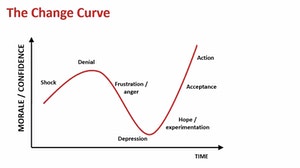As part of Leeds Digital Festival 2020, I tuned into Alun Davis’ webinar on Client Management in a Crisis: Planning For a Post Covid-19 Future. As an Interim Marketing Director and Consultant who has worked through several recessions, Alun had plenty of useful insights to share, so I’ve summarised some of the key takeaways from the webinar below.
Where are we now?
Alun began by acknowledging that while businesses are being encouraged to carry on selling, marketing, and to just generally carry on as normal, the current situation we find ourselves in is far from normal. 66% of businesses have been forced to furlough staff and more than 50% have 3 months cash (or less) left in the bank. Understandably, for any given client, their relationship with us, as an agency supplier, may not be at the forefront of their mind. This is the context in which we now have to manage successful client relationships.
Client Management in a Crisis: What to do (and what not to)

1. Don’t stop selling. While this may seem counter-intuitive in the current climate, not to mention insensitive towards clients who are struggling, Alun pointed out that the world does not, in fact, need our support or concern, they just need us to do our job, but in a way that reflects the current climate.
2. Embed new communication protocols. Alun highlighted the importance of establishing new remote-friendly methods of communication. Critically important, he stressed, is getting client buy-in on the new approach to comms, delivering any bad news via video call, and experimenting with channels that may be less disruptive to people’s home lives – like messaging. We have to bear in mind that clients are also people (!!), who may be juggling additional responsibilities at home, like looking after children.
3. Be relevant. Alun advised undertaking a ‘Covid-19 impact assessment’ for all clients, in order to understand the challenges and opportunities presented to each individual business. This is something we have carried out across the team at Impression. A useful model to refer to is the change curve (below):

As an agency, we need to understand where any given client falls along this curve (at any given moment) – and ideally help them in their journey towards the action stage.
4. Be clear on your own client management strategy. We wouldn’t be able to execute any of the above if we weren’t confident in our own crisis management strategy. Any company’s strategy for navigating this crisis should stay true to company culture, but also reflect the financial reality, according to Alun. This may present difficult decisions, with regards to choosing particular clients over others, offering to pause/cancel or discount contracts or over-service clients. Alun advises staying clear of discounting services, as this can cause resentment in the longer-term. Instead, Alun suggests bundling services together, or encouraging clients to extend contract lengths in return for a small discount.

5. Keep it simple. More than ever, Alun emphasised the importance of keeping things simple – there’s no need to add to what is already an incredibly complex situation.
Planning for a post Covid-19 future
The reality is that there are more unknowns than knowns right now, but how can we go about preparing for the post-pandemic climate?
6. Master the art of the online meeting. And no, this doesn’t just mean wearing workwear on your top half whilst wearing sweatpants on the bottom! We’ve adapted to the use of online meeting technology so well over the past few weeks, and it’s undoubtable that such technology will continue to play a huge role in the way that businesses operate, even after the pandemic. Alun kindly shared his pre-meeting checklist, which he explained had remained practically unchanged in the context of preparing for a virtual meeting. Steps such as preparing an agenda, the correct IT equipment and completing a final run through remain consistent, with perhaps only travel and logistical considerations being dropped from the prep. The same principle applies during meetings and to sending your follow ups.

7. Review ideation processes. Alun highlighted that the crisis has revealed a need for us to review our ideation processes, particularly in regards to becoming faster and nimbler at coming up with great ideas.
8. Make scenario planning the new normal. While we don’t yet know what a ‘new normal’ will look like, Alun speculated that it will likely involve more detailed scenario forecasting when strategising for clients. He also floated the idea that our ‘old normal’ ended 4 years ago, when we voted to leave the EU and many businesses lost economic certainty.
Alun also touched on 3 current trends that he believes will be (or are already being) amplified as a result of the pandemic:

- New technologies will be adopted more quickly
- Global supply chains will be recast
- Corporate concentration and croynism will increase
Ending with some final predictions on the industries and/or companies who are likely to come out of the crisis strong, Alun placed his bets on big tech companies, particularly FANG stocks (Facebook, Apple, Amazon, Netflix, Google & Microsoft), as well as large employers who are well connected to the government.
Whatever the case may be, we’re starting to see some signs that, here in the UK, we may be over the hump (at least of the initial outbreak) of the virus, so it’s time to start preparing your business, and your clients, for the post Covid-19 landscape.



